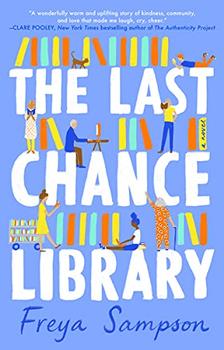Summary | Excerpt | Reading Guide | Reviews | Beyond the book | Read-Alikes | Genres & Themes | Author Bio

If your happy home life exploded when you were only 10 years old, you too might prefer books to people. Loveday Cardew experienced this so, as soon as she could, she left everything behind to work in a secondhand bookshop in York, England. However, hiding herself within the stacks obviously isn't working as someone is sending books to the shop that might have come from her childhood home. Getting to the bottom of this mystery means more than just finding the culprit.
This is one of those novels that ticks a whole lot of boxes for me, especially the fact that it takes place in a bookshop. Seriously, what book reviewer worth their salt can resist a novel with that word in the title? Another one of those ticked boxes is the mystery behind who is sending Loveday all those books. I love a good mystery, especially if it's one that doesn't involve too much violence. Admittedly, author Stephanie Butland does include some of that here, particularly the way Loveday's father dies, but there's nothing overly visceral or graphic. Another box? That the action takes place in York, an historic walled city in northern England that I've been to several times and totally adore.
The way Butland draws Loveday is compelling. Here's a girl who loves books so much, and is so able to find things in them that she can relate to, that she's been tattooing her body with the first lines of novels that have special meaning to her. That one of these novels is one of my all-time favorites (The English Patient) is just a bonus for me. Butland also makes Loveday fiercely independent. Obviously, she needed to be self-sufficient so that she could remove herself from her past. She also has a whole lot of common sense and has learned from her mother's mistakes. The best part about Loveday; the thing that I truly adored about this novel, is her voice: a combination of acerbic wit and straight forward humor which lightens what would otherwise be a very heavy atmosphere. Added in is a good bit of self-deprecation along with an oddly hefty lack of self-awareness. These attributes find some resolution as the novel progresses, thereby showing an excellent feel for character development.
The characters both write and perform their original poetry at weekly, open-mic contests (see Beyond the Book). Since I used to write poetry myself, I'm very appreciative of both the genre and the inclusion of it in works of prose. But I also had two problems with these poems. They seemed overly obvious to me, sounding more like artistically chopped up prose and, although they were supposed to have been written by two different people, all the poems were in the exact same writing style. The former is a matter of taste, and I realize some people prefer this type of conversational and easily understandable poetry, but I lean more towards evocative language that allows the reader to visualize the poem and leaves the meaning up to interpretation. The latter, however, bothered me much more because no two poets would ever sound so much the same. I realize that Butland wrote these poems to be easily understood, but I wish the voices had been more distinct.
Loveday is an admirable young woman who is very witty and ultimately realistic. The plot of The Lost For Words Bookshop has just enough intrigue and mystery and is peopled with honestly believable characters that I warmly recommend it.
![]() This review
first ran in the July 11, 2018
issue of BookBrowse Recommends.
This review
first ran in the July 11, 2018
issue of BookBrowse Recommends.

If you liked The Lost for Words Bookshop, try these:

by Freya Sampson
Published 2021
June Jones emerges from her shell to fight for her beloved local library, and through the efforts and support of an eclectic group of library patrons, she discovers life-changing friendships along the way.

by Peter Swanson
Published 2021
From the hugely talented author of Before She Knew Him comes a chilling tale of psychological suspense and an homage to the thriller genre tailor-made for fans: the story of a bookseller who finds himself at the center of an FBI investigation because a very clever killer has started using his list of fiction's most ingenious murders.
Your guide toexceptional books
BookBrowse seeks out and recommends the best in contemporary fiction and nonfiction—books that not only engage and entertain but also deepen our understanding of ourselves and the world around us.